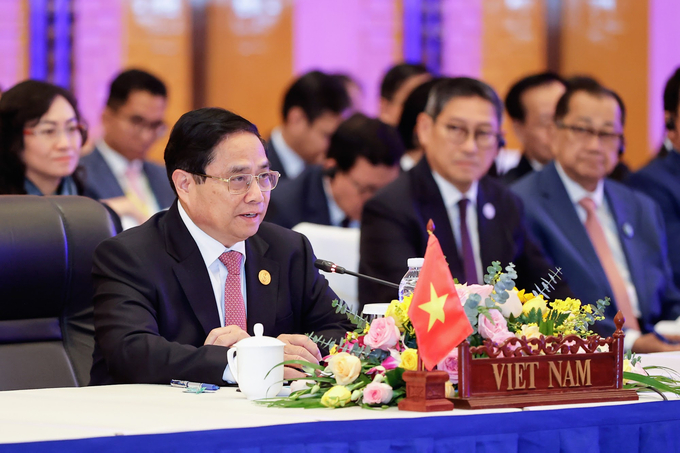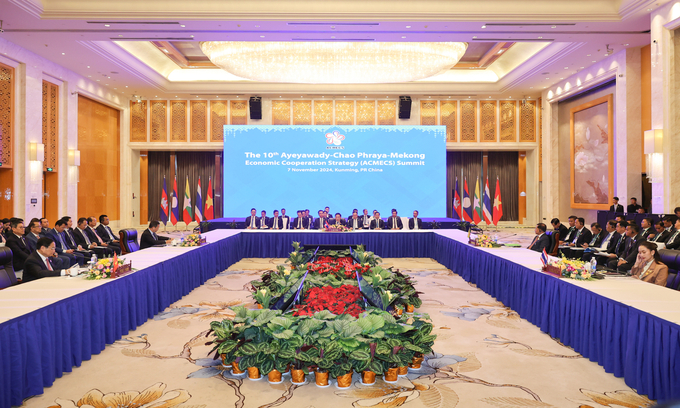June 16, 2025 | 20:46 GMT +7
June 16, 2025 | 20:46 GMT +7
Hotline: 0913.378.918
June 16, 2025 | 20:46 GMT +7
Hotline: 0913.378.918

Prime Minister Pham Minh Chinh proposed six key areas for ACMECS cooperation to achieve breakthroughs. Photo: VGP.
At the invitation of Lao Prime Minister Sonexay Siphandone, on the afternoon of November 7, Prime Minister Pham Minh Chinh led a high-ranking Vietnamese delegation to attend the 10th Ayeyawady-Chao Phraya-Mekong Economic Cooperation Strategy (ACMECS) Summit in Yunnan Province, China.
The Ayeyawady-Chao Phraya-Mekong Economic Cooperation Strategy, named after the three principal rivers in the Mekong River basin, is an economic cooperation framework encompassing Cambodia, Laos, Myanmar, Thailand, and Vietnam. Its goals are to foster multilateral and bilateral economic cooperation, leverage regional and national comparative advantages, enhance competitiveness, and reduce development gaps.
Cooperation on Mekong water resources was a focal point at the summit. Leaders of the five member countries agreed to strengthen efforts in the sustainable management of transboundary water resources, with particular emphasis on coordination with the Mekong River Commission, sharing hydrological data, and establishing an early warning system for natural disasters. A concept document on water resource management in the Mekong subregion was also adopted, aimed at enhancing strategic coordination among members in addressing both immediate and long-term challenges.
In his remarks, Prime Minister Pham Minh Chinh underscored ACMECS's pivotal role in Mekong subregional cooperation, describing it as an essential component of the ASEAN Community, a gateway linking ASEAN with Northeast Asia and Southeast Asia, and a bridge connecting the Pacific and Indian Oceans.

The 10th ACMECS Economic Cooperation Strategy Summit took place on November 7 in Yunnan Province, China. Photo: VGP.
The Prime Minister noted that the world is entering an era of innovation, presenting critical opportunities for development, not only for individual nations but for the entire subregion. With this perspective, he outlined six key areas of focus for ACMECS cooperation to drive transformative progress in the coming period.
First, he emphasized the importance of aligning actions and ensuring smooth transition from strategy to implementation. To support this vision, he announced Vietnam’s commitment of $10 million to the ACMECS Development Fund.
Second, he highlighted the need to balance tradition with modernity, ensuring the synchronized and harmonious development of both traditional economic sectors and emerging technology-driven industries.
Third, he underscored the importance of linking rapid growth with sustainability by promoting green transformation, building a circular economy, and encouraging a sharing economy model.
Fourth, he called for strengthening connectivity within the region and with the global market, to ease the flow of goods, services, and people among the five countries. The Prime Minister recommended that the member states enhance information sharing and coordinate closely in developing economic policies and plans.
Fifth, he advocated for connecting government with people and businesses, with a focus on inclusivity. This includes projects aimed at benefiting communities, especially in remote areas, as well as supporting businesses to participate in regional and global supply chains.
Sixth, he stressed the importance of linking development with stability and security, proposing that ACMECS deepen its cooperation to combat cross-border crimes, particularly drug and cyber crimes, and prevent criminals from using one country’s territory as a base for activities against another.
Prime Minister Pham Minh Chinh’s proposals received strong endorsement from the conference, and they were incorporated into the summit’s official documents.
At the conclusion of the conference, the leaders adopted the Vientiane Declaration and witnessed the transfer of the ACMECS Chairmanship from Laos to Myanmar.
Translated by Quynh Chi

(VAN) The working delegation from the Ministry of Agriculture and Environment conducted an important trip to the Netherlands to strengthen strategic partnerships and sustainable development in the agricultural sector.

(VAN) The letter ‘A Plea from the Ocean’ not only evokes emotion but also awakens the human conscience to the responsibility of protecting life on Earth.

(VAN) The Department of Agriculture in South Africa has announced the country’s first mass vaccination of poultry to prevent local birds from contracting avian influenza.

(VAN) Establishment of the Mekong Delta Regional Agricultural Linkage Center, aiming for a closed value chain, deep processing, trading platforms, and international market connectivity.

(VAN) Gia Lai province has recently recorded 460 rare species of animals and plants, contributing to forest conservation and biodiversity planning in the region.

(VAN) Ms. Caroline Beresford, New Zealand Ambassador to Vietnam, expressed confidence that agricultural cooperation between Vietnam and New Zealand will develop sustainably, be climate-resilient, and promote gender equality.

(VAN) Vietnam reaffirms its commitment to international cooperation in fostering sustainable and responsible fisheries while ensuring resilient livelihoods for small-scale fishing communities.